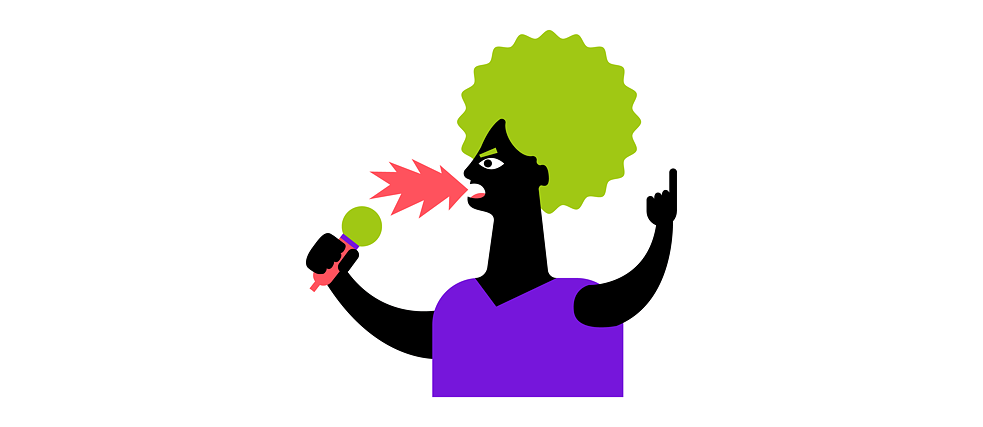Word! The Language Column
The Art of the Insult

Who still knows how to insult with style in our day and age? asks Jagoda Marinić. Forced harmony is no more constructive than aggressive invective. She recommends cultivating the complexity of German syntax – which make it easier to argue incisively and formulate dissent.
By Jagoda Marinić
Language becomes particularly interesting when it is meant to, able to or allowed to offend. The art of the insult requires a refined feel for language and an ability to articulate barbed thoughts precisely.
Dissing has become difficult in our day because two camps have formed: For some, any attempt to disparage is not an art, but an impropriety, a lack of decorum. They swear by harmony and have been conditioned by Facebook and other social media to believe the only allowable expressions of opinion are thumbs up or shut up! Even the slightest hint of criticism makes these conflict-averse souls break out in a cold sweat; they speak sotto voce even in the most innocuous conversations, as if a single decibel too loud might hurt the feelings of someone present and as if everyone ought to go out of their way to avoid stepping on anyone’s toes or disturbing any imaginary ants hard at work under a nearby stone.
Bowdlerizers vs. brutes
These soft-spoken conflict avoiders are the fabric softeners of language: kindly tone down every word, they implore, take the edge off every thought, lest it cause p-o-l-a-r-i-z-a-t-i-o-n! A critic of language and culture like Karl Kraus, not to mention a caustic satirist like social critic and journalist Kurt Tucholsky, would not have endured two sentences from such consensus-seeking bowdlerizers. So it seems that harmonistic linguistic habits are not a contemporary problem at all, but a cultural one, as Tucholsky observed way back in 1919: “When someone cracks a good political joke in Germany, half the nation sits around on the sofa taking offence.”Which brings us back to the 1920s and the other, distressing side of the coin, the other camp, whose henchmen were known for the kind of crude slurs that brutes invariably use, even in the most inappropriate situations, to vent their rage. These boors don’t bother looking for an unusual turn of phrase or amusing alliteration with which to vex their victims. Instead, they immediately resort to scatological profanities and pull open soiled pigeonholes into which to stuff – and ideally off – their opponents. Some, for example, cry “warmonger!” whenever anyone points out that Ukraine would be entirely at the mercy of the Russian aggressor without arms supplies. That’s not an argument, it’s just boorish name-calling. And women are often reviled with various W-words – although whores and witches are actually worthy creatures. Often as not, the disparagement mutates without warning into the attribution of a whole world view with which to vilify the dissenter.
Being able to express and abide ambivalence and ambiguity
Language is a discursive tool. It enables us to engage in discussion and debate – and to deal with dissent. Not for nothing does the German language have plenty of different ways of inserting subordinate clauses and a complicated grammar in general that allows for nuances. The language itself enables dialectic, though its speakers apparently can’t always stand it. Two very different views can be spelled out at once in the mouth and in the mind without having to play them off against each other. Its nested syntax may be the butt of much ridicule, but the German language in particular is fitted out with the requisite tools to cope with ambiguity and ambivalence.Instead, however, blanket generalizations get bandied about on every side of the political divides. They talk about “Nazis”, “apartheid” and “genocide”, to name just a few such catchwords. The drastic nature of these epithets tends to stymie dialogue and ultimately lead to the opposite: defensiveness instead of discussion. Could we learn to trade barbs playfully and skilfully – sometimes even gently ad hominem – in such a way that nobody would lose face? Could we learn to keep the argument sophisticated, openminded and respectful? What we need is a culture of prickly verbal jousting in which we duly acknowledge that, given the complexity of the world we live in, we’re not about to come up with a simple answer to which everyone will nod in agreement. Cultivated conversation might help us endure this predicament a bit more easily.
Word! The Language Column
Our column “Word!” appears every two weeks. It is dedicated to language – as a cultural and social phenomenon. How does language develop, what attitude do authors have towards “their” language, how does language shape a society? – Changing columnists – people with a professional or other connection to language – follow their personal topics for six consecutive issues.